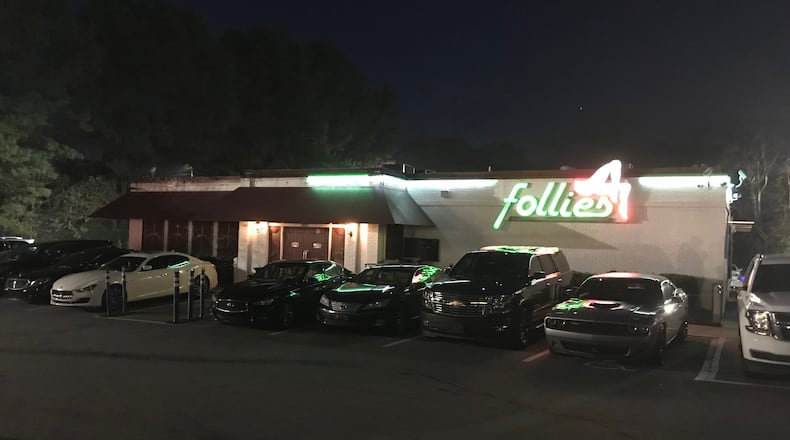Owners of Follies strip club are suing the city of Chamblee, accusing local officials of adopting city ordinances intended to shut down the club by revoking its liquor license, outlawing lap dances and forcing it to close after midnight.
The federal lawsuit filed Monday marks an escalating legal battle between Chamblee and its only strip club, which joined the city five years ago when Chamblee annexed the area of Buford Highway where the business is located.
Chamblee as well as neighboring Brookhaven have become the latest suburban communities to crackdown on late-night clubs that city officials view as a nuisance. The lawsuit filed by Follies' parent company, WBY Inc., is the third suit the club has filed against the city this year.
The club accuses city officials of violating civil rights provisions regarding freedom of speech, freedom of expression and equal protection under the law. The club has asked a judge to bar the city from enforcing the new adult entertainment regulations.
The lawsuit said city leaders knew the restrictions would force it out of business.
“The City drafted an ordinance (or amended existing ordinances) to eliminate adult entertainment within its borders,” the suit states.
Follies is represented by attorney Cary Wiggins, who successfully challenged changes to Brookhaven's liquor laws this year and has represented several other Atlanta area strip clubs battling local governments. Wiggins declined to comment, saying his clients had not yet authorized him to talk to the media about the lawsuit.
A Chamblee spokeswoman said the city would not comment on pending litigation.
The lawsuit is a response to a new adult entertainment ordinance approved unanimously by the Chamblee City Council in October. The legislation includes several statements describing adult businesses as havens for criminal and immoral behavior and justifying the changes as necessary to reduce blight and improve quality of life.
In addition to the ban on lap dances and restrictive hours, the new law requires dancers to be partially clothed and bans customers from consuming alcohol at the club. At the same meeting, the city modified its liquor laws to ban strip clubs from having a liquor license, effective in January.
Earlier this year, the club sued the city, which has 29,000 residents, after a February raid that resulted in two citations. One cited the club for having an empty fire extinguisher and another accused it of illegally serving alcohol by the bottle.
Follies said the Chamblee Police Department launched the raid during a peak time, showed up with an unnecessary number of officers then blocked patrons from exiting. That lawsuit, now combined with another filed by the owners of Mansion Elan nightclub also in Chamblee, says the raid was excessive and unlawful.
That suit is pending in federal court.
Because of the two citations, a Chamblee hearing officer suspended Follies’ liquor license for three days in June. The club appealed.
The City’s Alcoholic Beverage Review Board upheld the hearing officers’ findings, and increased tensions with the club when it modified the suspension to 30 days. That is now the focus of a separate lawsuit the club filed in DeKalb’s Superior Court, urging a judge to review the decision and the way the city conducted the board meeting.
Monday’s lawsuit in U.S. District Court in Atlanta challenges the legality of Chamblee’s adult entertainment rules and liquor license changes approved in October. It argues that Follies should be shielded by an agreement that strip clubs reached with DeKalb County in 2001, when the club property was still in the unincorporated area.
That agreement allowed it to remain a nude club and sell liquor, and the terms were binding on any city that annexed the area in the future, according to the lawsuit.
In 2007, there was an amendment to the agreement which extended the terms for 15 years. The amendment required strip clubs to pay the county $100,000 annually through 2017, then $150,000 for the remaining five years until the deal expired in 2022.
Follies’ now pays that money to Chamblee, which after annexing the club in 2013 passed a resolution recognizing the agreement and allowing it to continue serving alcohol and featuring nude dancing, according to the lawsuit.
About the Author
Keep Reading
The Latest
Featured




